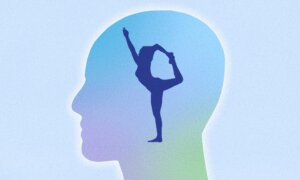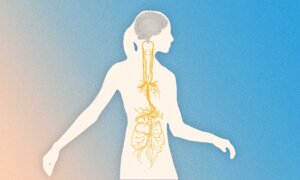College life and the transition into adulthood can be a challenging part of the journey to independence. Studies find the transition is marked by significant physiological and psychological changes, including increased stress. Consequently, anxieties can heighten and even become overwhelming. The effects that ensue can be serious and potentially involve a higher risk of suicide.
While parents may want to help, that can bring its own stressors for young people. The good news is that a diverse array of management practices can improve coping skills and may lower or prevent anxiety. Mental health experts offer advice on how to navigate this vulnerable period.
Staying Balanced
Key to managing these challenges is a healthy lifestyle that includes exercise, a nutritious diet, and sleep, as these can significantly affect mental well-being, Tatiana Rivera Cruz, a licensed clinical social worker, told The Epoch Times in an email.
“Seeking support from friends, family, or mental health professionals can provide valuable coping mechanisms and emotional support,” she wrote. “Additionally, engaging in hobbies and activities that bring joy and relaxation can offer a necessary break from stressors.”
Rivera Cruz added that developing time management skills can help balance multiple responsibilities with personal life. Integrating these practices into daily life can help young adults better manage anxiety and enhance their overall quality of life.
Key to Helpful Parenting
Parents may want to offer support, but that isn’t always helpful.
A study published in the journal Emerging Adulthood found that when parents initiated nearly all the communications, it resulted in negative feelings.
“That could be indicative of over-involved parenting,” Jennifer Duckworth, a Washington State University human development department faculty member, said in a statement.
“It can be a fine line, but students with so-called ‘helicopter parents’ could have a more negative view of their relationship with those parents.”
When parents had a more balanced connection with their college-aged students, the benefits were clear. The researchers found that increased communication, discussions about friendships, student honesty, perceived support, and parental advice were associated with positive feelings about the parent-student relationship the next day.
Sleep
One new resource that may help young adults with their transition to adulthood is an upcoming new book, “Confidently Chill: An Anxiety Workbook for New Adults,” by Duygu Balan, a licensed professional clinical counselor, and Dr. Yener Balan, a distinguished fellow of the American Psychiatric Association. In an email to The Epoch Times, the authors shared some pointers from their book.
Like Rivera Cruz, Yenner and Duygu Balan emphasized the importance of healthy lifestyle practices, especially getting adequate sleep.
“To improve your sleep, consider a comprehensive approach, addressing both physical and behavioral factors,” they wrote. “Ensuring a consistent bedtime routine, optimizing your sleep environment, and managing substances like caffeine and alcohol can greatly enhance your sleep quality.”
Such efforts to promote sleep are worthwhile, as a study published in Sleep Medicine Reviews suggested the need for rest, noting that insufficient sleep can cause or worsen anxiety.
Gratitude
“The practice of being thankful and appreciative is both an emotional and cognitive process that fosters well-being,” Yenner and Duygu Balan wrote. “It involves recognizing positive qualities in oneself, others, and the world, as well as enhances emotional resilience, boosts mood, and decreases symptoms of anxiety.”
Gratitude has been shown to improve self-esteem, promote prosocial behaviors—such as empathy and generosity—transform one’s outlook, and deepen connections with others, according to the authors.
To implement these practices, they recommended keeping a gratitude journal to document daily moments of appreciation or creating a gratitude jar to collect notes of specific things that elicit thankfulness.
Enjoyable Activities
The Balans concur with Rivera Cruz’s advice to incorporate activities that bring joy into a weekly schedule. Taking time from study and work to do something fun may feel like a forbidden pleasure, but it promotes mental health.
They suggested picking an immersive activity that requires most of your energy and focus but does not cause stress. It may be reading to your niece or feeding ducks in the park. Other examples may include bird watching, gardening, journaling, listening to music, praying, reading, and spending time with animals.
Learn to Say No
Assertiveness is needed when a student is pressured to do something unduly taxing energy and time.
Yenner and Duygu Balan wrote, “Learning to say no is vital for maintaining boundaries and protecting both mental and physical well-being.”
“While many people fear conflict and disappointing others, setting limits is essential to avoid burnout and to cultivate healthy relationships,” they added.
When deciding whether to consent to a request, they advised examining whether you genuinely want to commit or are acting out of guilt or fear of missing out. Taking time before responding allows you to assess your energy, priorities, and commitments, ensuring a thoughtful, genuine choice.
“When turning down an invitation, being respectful yet clear helps maintain relationships while honoring your boundaries,” the authors wrote.
“With practice, saying no becomes more natural, leading to greater self-awareness and preservation of your time and energy for what truly matters.”
Expressive Writing Therapy
Expressive writing—documenting your thoughts and feelings—provides invaluable insights and can serve as a historical record of your emotional and cognitive state at the time of writing, Yenner and Duygu Balan wrote.
“This reflective practice promotes physiological health, enhances self-understanding, and supports resilience, contributing to better overall life management,” they noted.
Engaging in these techniques not only fosters personal growth but can also lead to improved academic and career outcomes and offers a foundation for assessing personal growth and healing over time, they said.
Perfectionism
“Perfectionism—especially in areas like academics, sports, and work—often stems from the unrealistic demand for flawlessness, leading to harmful mental health consequences,” Yenner and Duygu Balan wrote.
“The pressure to compare oneself to others, amplified by social media, can fuel anxiety, self-criticism, and poor performance, while draining energy and focus.”
Additionally, perfectionism fosters an all-or-nothing mindset, where one views themselves or their achievements in extremes, ignoring the nuance and balance of real life, they explained. By embracing self-compassion and rejecting rigid thinking, individuals can find greater confidence and comfort in the imperfect middle ground.
Compassion Versus Kindness
Yenner and Duygu Balan noted how compassion and kindness are closely related concepts yet differ in meaningful ways.
“Compassion involves empathy, where one deeply connects with another’s suffering, acknowledging their pain with an emotional understanding, and often includes the desire to alleviate their distress,” they said.
“Kindness, on the other hand, is expressed through actions or attitudes, such as offering time or assistance, without necessarily needing an emotional connection or understanding of the other person’s experience.”
Acts of kindness, such as holding a door open, can be simple gestures that uplift others, while compassion delves deeper into the emotional realm.
Both compassion and kindness enhance relationships, create a sense of community, and positively affect both the giver and receiver, spreading happiness and connection, the authors stated.
“Embracing these attributes towards others and ourselves allows for acts of understanding, self-care, and generosity, enriching our lives and the lives of those around us,” the authors wrote.
A study published in the American Journal of Lifestyle Medicine supports the author’s insights on the value of showing kindness and compassion. It stated that compassion and kindness promote beneficial emotional changes that buffer the response to stress and increase resilience.
Humor
Humor is a mature defense mechanism that contributes to a healthier, more fulfilling outlook on life by blending cognitive and emotional processes, Yenner and Duygu Balan wrote.
“It involves both situational and verbal elements, serving as a social tool that brings people together and facilitates bonds.”
“Humor can deflate tension, provide emotional release, and offer a broader perspective on complex topics. When used constructively, it fosters communication, strengthens relationships, and deepens social connections while boosting self-esteem and resilience,” the authors added.
A study published in Europe’s Journal of Psychology points out that the type of humor can make a difference. It found that while benevolent humor can reduce anxiety and stress, darker styles of humor can have the opposite effect. Specifically, irony had a negative effect on anxiety and stress.
Social and Digital Media Use
Excessive social and digital media use has been linked to a wide array of mental health concerns, including anxiety. According to a
review published in the Journal of Technology in Behavioral Science, while such media offers advantages, it also is associated with risks. Prolonged screen time can lead to increased mental health symptoms—especially among youth.
In 2023, the surgeon general issued an advisory highlighting the harm they can cause.
Yenner and Duygu Balan delineate some of the potential problems. “Overstimulation from constant online engagement diminishes creativity and real-life social connections. Additionally, cyberbullying, racial discrimination, and predatory behaviors present serious risks, especially for vulnerable populations, leading to feelings of loneliness, shame, and stress,” they wrote.
To mitigate these issues, the authors recommend limiting screen time, especially before bed, and prioritizing face-to-face interactions to strengthen social bonds and emotional regulation.
Time Management
Yenner and Duygu Balan suggested creating a schedule to plan daily tasks and goals, allowing individuals to control their time and reduce uncertainty.
“By organizing responsibilities, anticipating commitments, and allowing for moments of calm, one can foster a sense of balance, increasing both productivity and emotional well-being,” they wrote.
Setting Goals and Systems
Focusing on personal and professional growth through setting goals and aligning them with your values leads to resilience and helps navigate challenges, Yenner and Duygu Balan said.
“Goals are specific, measurable tasks and something that you can accomplish,” they wrote. “An example of a goal may be ‘completing college,’ it is defined and is clear when it is completed.”
Systems, on the other hand, are the routines and processes that ensure you stay on track with your goals, minimizing stress and optimizing time, they said. Goals and systems create a framework for managing anxiety, helping people stay grounded and focused.
Wrap-Up
Coping with anxiety may begin with healthy lifestyle practices, including regular exercise, eating a nutritious diet, and getting adequate sleep, which help promote the energy and stamina necessary for coping with stress. Frequent parental communication—that the parent doesn’t always initiate—helps foster positive feelings and deepen parent-child bonds, a benefit that can counter anxiety.
Such measures are complemented by techniques involving creativity, such as expressive writing, and practical approaches, such as learning to say no. A completely stress-free life may not be possible, but when anxiety starts to build, consider trying some of the above strategies to keep it manageable.













